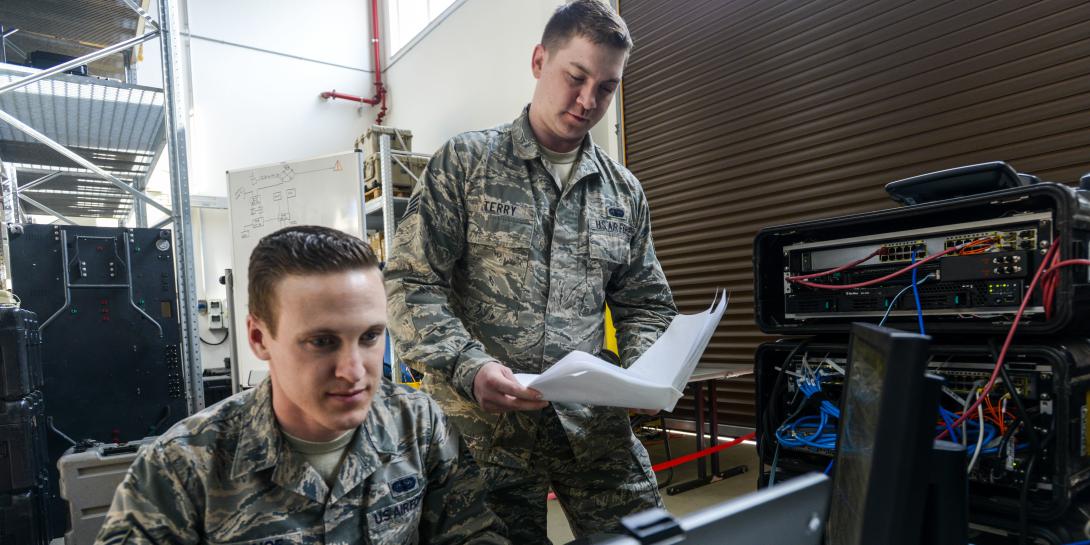New Cyber Training Unit Empowers Digital Defenders
The Air Force has stood up the Cyber Security and Defense Formal Training Unit, or FTU, at Keesler Air Force Base. The new cyber education detachment will enable a more “streamlined training pipeline” for airmen to build their foundational cyber warfare capabilities for future service, joint and national responsibilities, leaders say.
Working in conjunction with the 81st Training Wing at Keesler, the FTU will provide the initial cyber training to airmen that are heading to Cyber Security and Control Systems (CSCS) operational units. The delivery of standardized initial qualification training, or IQT, to the cyber operators before they have to employ the cyber weapon system in their units will make the operators more prepared and alleviate the unit’s task of having to train them during missions.
“The establishment of this dedicated formal training unit removes the burden of delivering IQT by the CSCS squadrons, allowing them to focus on executing operations,” noted Master Sgt. Jason Cordell, USAF, superintendent for the 39th Information Operations Squadron (IOS), Detachment 2 at Hurlburt Field, Florida.
In addition, locating the FTU at the Air Force’s center of technical training also made sense, Sgt. Cordell said.
“Activating our unit here on Keesler, allows us to work closely with the Keesler training squadrons, so that we can maximize the total force—active duty, Air National Guard and Air Force Reserve—airmen’s employment time by providing IQT prior to their arrival at their new unit,” he stated. “Essentially, the airmen finish Initial Skills Training with the 81st Training Group, then immediately transition to IQT with us, prior to departing for the next assignment. They arrive at their gaining unit with the necessary cyber knowledge to accomplish their new mission.”
Airmen that will be conducting cyber protection-related missions, such as protecting Air Force or DOD networks, require an understanding of the CSCS, which performs network operations and incidence resolution activities. According to the Air Force, CSCS crews monitor, assess and respond to real-time network events and identify and characterize anomalous activity. They also respond to events when directed.
Aligned under Air Combat Command, the new FTU reports directly to the 39th IOS as part of the 318th Cyberspace Operations Group under the 67th Cyberspace Wing, which is located at Joint Base San Antonio-Lackland, Texas.
“Our first-year priority is to achieve full operational capability, allowing us to teach all initial qualification training courses for the CSCS weapon system,” Sgt. Cordell indicated. “Activating a new unit from the ground up has many challenges, but once we have a full instructor cadre and support staff, we will be able to meet our FOC [full operational capability] goal.”
Col. Jeffrey Phillips, USAF, commander, 67th Cyberspace Wing, is relieved that the new unit is taking on the focused cybersecurity and defensive training from operators. “We realized the burden we are placing on the operational units of training those offensive operators,” Col. Phillips said. “We recently set up Detachment 2 at Keesler, and now those units can focus on operations and not having to worry about getting their airmen trained while conducting operations. We're pretty excited about that.”
The FTU is gearing up to reach full operational capability by January 2022 and hopes to be running all of its courses by then. The unit already is offering an entry level course that every operator needs, Sgt. Cordell noted.
“Over the course of the next six months we will be rolling out position-specific courses that the students will move onto after completing the entry level one. We are teaching full-size classes at this time,” the master sergeant reported. “[And we will continue to] work closely with the CSCS community and Air Combat Command to ensure we are delivering the highest quality training that is relevant for our operators.”






Comment
Awesome! I am a retired USAF
Awesome! I am a retired USAF Minuteman III missile crew member and it was set up similar to at Vandenberg AFB. Keep up the go work!
Comments